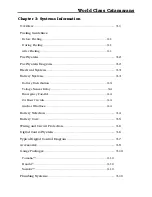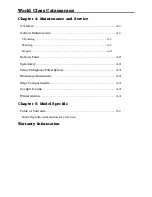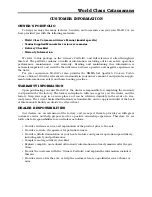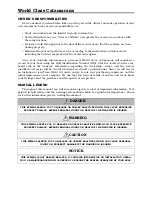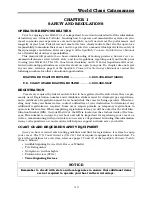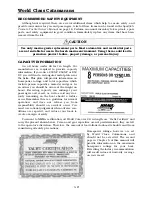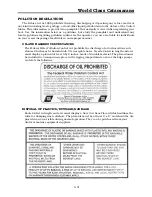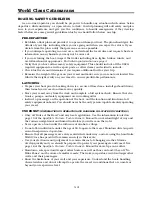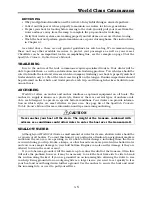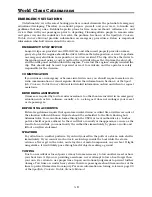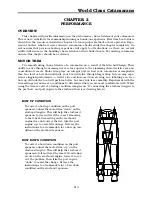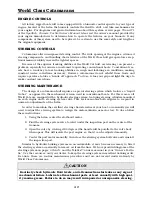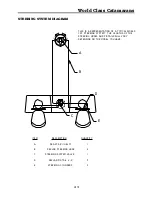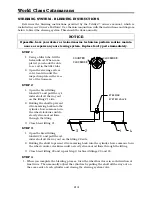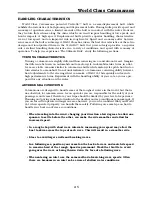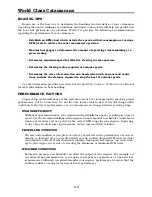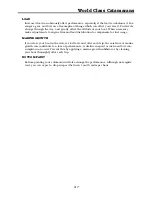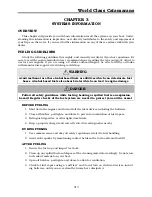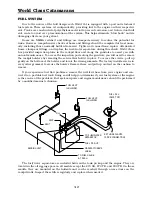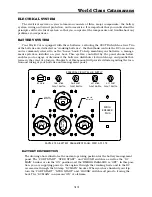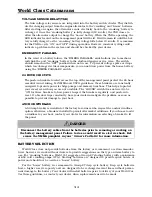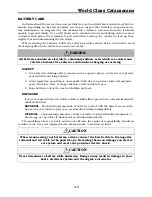
World Class Catamarans
1-4
BOATING SAFETY GUIDELINES
As an owner/operator you should be prepared to handle any situation which arises before
departure, while underway, or upon return to dock. Careful planning will add safety and plea-
sure to your experience and give you the confidence to handle emergencies if they develop.
Listed below are some general guidelines which you should follow before any trip:
PRE-DEPARTURE:
• Establish a float plan and provide it to a person whom you trust. The plan should give the
details of your trip, including where you are going and when you expect to return. If you
deviate from the plan, notify that person as soon as possible.
• If you anticipate operating in a new area, understand the local rules and request charts or
information on any hazards you may not be aware of.
• If you are towing the boat, inspect the trailer including tires, lights, brakes, winch, and
overall mechanical appearance.
For trailering information see page 4
• Verify that you have all necessary safety equipment. This should include all the USCG
required equipment as well as spare parts or other items you decided to include.
• Check fuel levels and determine if you require additional fuel for your trip.
• Examine the weight of the gear on your vessel and make sure you are not overloaded. Dis-
tribute the weight evenly on your vessel to ensure predictable performance.
LAUNCHING:
• Prepare your boat prior to backing down, (i.e. secure all lose items, install garboard drain),
then launch your vessel and move away quickly.
• Move your vessel away from the dock and complete a full system check. Ensure that elec-
tronics, pumps, and safety equipment are in working order.
• Instruct a passenger on the operation of the boat, and the location and function of all
safety equipment onboard. You should never be the only person capable of safely operating
your vessel.
UNDERWAY:
(INFORMATION ON OPERATION AND HANDLING IS LOCATED IN CHAPTER 2)
• Obey all “Rules of the Road” and any local regulations. Use the information located on
page 19 of the
Sportfish, Cruisers, Yachts Owner’s Manual
to understand right of way and
the various navigational and hazard indicators you will see on the water.
• Never operate a boat under the influence of alcohol or drugs.
• Do not allow individuals under the age of 16 to operate the vessel. Maintain direct supervi-
sion of inexperienced operators.
• Ensure that all passengers are safely seated while underway, and are using the hand rails
World Class has provided to remain securely in their seats.
• Use your electronics and judgement to remain abreast of changing weather. Storms
develop quickly and you should be prepared to protect your passengers and vessel. See
page 16 of the
Sportfish, Cruisers, Yachts Owner’s Manual
for more tips on weather.
• Maintain a safe speed and respect other boaters as well as those on land. Obey all “No
Wake Zones” and be aware of smaller vessels. The wake you produce could endanger other
crafts and their passengers.
• Know the limitations of your craft and your experience. Understand the boats handling
characteristics and do not attempt to operate the vessel in conditions that are unsafe or
beyond your experience level.




